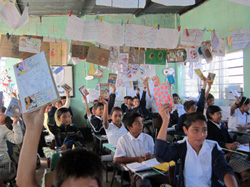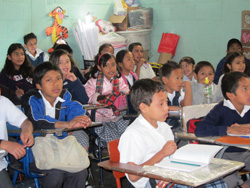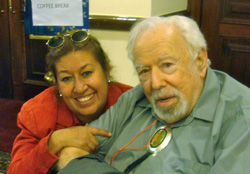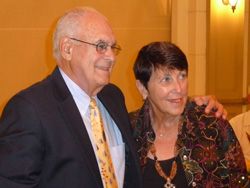As the children of the Santa Barbara school in Guatemala waved goodbye to us, I reflected on how shocked I felt when visiting their building. The structure had actually been built by parents and it was just about devoid of resources. But the impression of impoverishment was quickly dispelled. The school was full of exuberant teachers and students, and the youngsters’ literacy accomplishments were strung on clotheslines around their tiny classrooms.
 Guatemalan students
Guatemalan students
 Guatemalan students
Guatemalan students  Zully Soberanis and Ken Goodman
Zully Soberanis and Ken Goodman
(photo by Andi Sosin)  Jerry and Marcie Mondschein
Jerry and Marcie Mondschein IRA volunteers from the U. S. have been working in Guatemalan schools for some time. In conjunction with our affiliate, the Consejo de Lectura, the Guatemalan Reading Association (GRA), they mentor and train teachers to initiate new literacy practices in their classrooms.
This February I was invited to speak at the GRA conference, where I brought greetings from IRA, and was able to witness for myself this extraordinary partnership.
A Principal’s Journey
Zully Patricia Soberanis Montes, principal at the Santa Barbara school, was trained as a teacher at the Instituto Normal Mixto Rafael Aqueche. However, the preparation she received there was not fully suited to the reality she experienced in Guatemalan classrooms. This limitation was eventually overcome by a fortunate encounter.
“I found out about the Reading Council (Consejo de Lectura) in 1995, when I was invited to attend a meeting,” Zully explains. “I was a traditional teacher; I taught what I had learned in school, using the same old methods. When my colleagues shared their classroom successes, and when I went to a workshop taught by international volunteers who taught me a new way to teach, I felt liberated. I was set free from my previous ideas that had kept me tied to mediocrity. I decided to change.”
IRA Past President Ken Goodman and his wife Yetta contribute time and energy to the Santa Barbara school project. Ken remembers that when Zully arrived at her school in 1988, “she found a single room made of corrugated steel.” Yet, in 2013, this facility—the Escuela Oficial Rural Mixta Santa Barbara—was honored by the Ministry of Education for its high quality instruction. Zully is proud of her accomplishments:
We were congratulated for the high level of reading achievement of our students (82%), and mathematics (76%). We are the first school in zones 17, 18, 24 and 25 to receive this recognition. In our school the children are thinking, analyzing, looking at information critically, evaluating, expressing themselves, and making decisions. That makes me happy.
We are helping students become more than machines copying lessons from books. Through stories, we are able to transmit knowledge, develop thinking skills, discover new topics, and much more. We are forming leaders, positive individuals who will take Guatemala to new heights.
The Reading Council brought a special gift to my life. I have become more committed to changing education, not only in my school or my area, but in the entire country.
Enter the Mondscheins
Zully is very conscious of the fact that outside assistance was a huge driver of this success story. Indeed, she describes Marcia and Gerald Mondschein both as the “parents” of the Guatemalan Reading Council, and as “visionaries who came to help us improve our educational system.” Who are the Mondscheins? The story picks up in 1989 when volunteer educators from Long Island, New York’s Nassau Reading Council began its work with volunteer Guatemalan educators to improve literacy in Guatemala.
Marcie Mondschein and her physician husband, Jerry, had traveled to Guatemala for a medical project that didn’t transpire. While there, they embarked on a life-changing adventure with a few Guatemalan teachers. The teachers were on strike, and Marcie simply began presenting impromptu workshops for them. Marcie and Jerry returned seven months later to exchange ideas and begin planning for the future. These visits, now biannual, have become the Nassau Reading Council’s International Literacy Project with Guatemala.
Scores of colleagues have since joined Marcie. More than one thousand Guatemalan public school teachers now attend the biannual conference and yearly workshops. Presenters have come from Central and South America, Puerto Rico, New Zealand, and 18 states in the U.S.
Today, six satellite councils of the Guatemala Reading Association hold monthly workshops for hundreds of teachers. When GRA held its first International Literacy Conference, more than 1,500 teachers attended. Marcie says that attendees were amazed that they had a choice of presentations to attend. This year Yetta Goodman was the Keynote Speaker. The teachers were honored that she would come to Guatemala to share her expertise with them.
In 1999 Guatemala was chosen as the site for the Latin American Regional Conference of the IRA. Since 1991, three or four Guatemalan public school teachers are regularly awarded scholarships from state councils to visit schools in New York and to attend local workshops. Through donations from several IRA state councils and the sale of Guatemalan crafts at the IRA Annual Convention and regional conferences, more than 500 mini-libraries of new high quality books in Spanish have been donated to the country’s schools.
Success
The Guatemala Literacy Project was formally recognized by IRA in 1996 when Marcie received the Constance McCullough Award for the most exemplary literacy project in a developing country. As Marcie notes,
We have witnessed positive change from this project. Many Guatemalan educators who have participated in this collaborative partnership have returned to higher education and have attained degrees. Some have become teacher trainers throughout Latin America, and several have published professional books for Guatemala’s teachers.
There has been significant change in the educational philosophy of Guatemala and a renewed teacher enthusiasm for education. We have seen classrooms where cooperative and collaborative learning occurs and children are now actively involved in learning. We have seen teachers who have renewed enthusiasm for their chosen profession.
She is quite clear on the key ingredients that have driven this accomplishment. To begin with, the decision-making process has always been done by the Guatemalans, not the Americans. GRA members decide workshop content and details, scholarship recipients, and which schools receive the mini-libraries. Decisions are based on teachers’ attendance at GRA/local meetings and their willingness to share expertise by organizing and/or by giving workshops themselves.
Moreover, the project has carefully maintained its independence from outside funding sources. The teachers who began the Guatemalan Literacy Project decided not to seek funding or grants. They wanted this project to sustain itself.
Teachers Looking Back
And what has the teachers’ experience been? One alumna of the program is Roselia Reyes Caballeros, a founder and member of the Reading Council of Guatemala. Roselia has now co-authored numerous education and language textbooks and has trained over 30,000 teachers nationwide. She observes, “The Reading Council has given me self-confidence and increased my self-esteem. Education has become more equitable. I am more proactive in my teaching.”
Another alumna, Luz María Ortíz García, teaches in San Juan Sacatepequez, Guatemala, a very conservative community that, according to Luz, typically practiced the traditional methods of learning. Luz explains that the biggest effect the Guatemala Reading Council has had on her, is her discovery of “how all learning is social, and given in a group, and so we learn in Council workshops, sharing experiences applied in classrooms that have success.” She continues:
It is wonderful to see that we share the same passion for reading teachers in different areas, with different styles. I find that the main ingredient in a successful experience is the teacher, who is a guide, a mediator, with powerful questions who can achieve the best out of students, without seeking a standard thought, but valuing and celebrating contributions from each. I thank the IRA for spreading this philosophy, which helps us, intentionally plan all our activities to build critical thinking.
Contagious Enthusiasm
Reflecting back on my visit, it is quite clear to me that the activity of the Guatemala Reading Association, and the work of Marcie Mondschein and other volunteers, is quite simply contagious. A literacy fever has taken hold in the country, and more and more teachers are joining ranks in the cause of higher literacy for all Guatemalans. Those educators who are fortunate enough to experience this professional development firsthand will feel its effects for years to come.
 Jill Lewis-Spector is the vice president of the International Reading Association and a professor at New Jersey City University in Jersey City, NJ, jlewis-spector@/.
Jill Lewis-Spector is the vice president of the International Reading Association and a professor at New Jersey City University in Jersey City, NJ, jlewis-spector@/.
This article was originally published with additional sidebars in the April/May 2013 issue
of Reading Today. IRA members can read the interactive digital version of the magazine here. Nonmembers: join today!